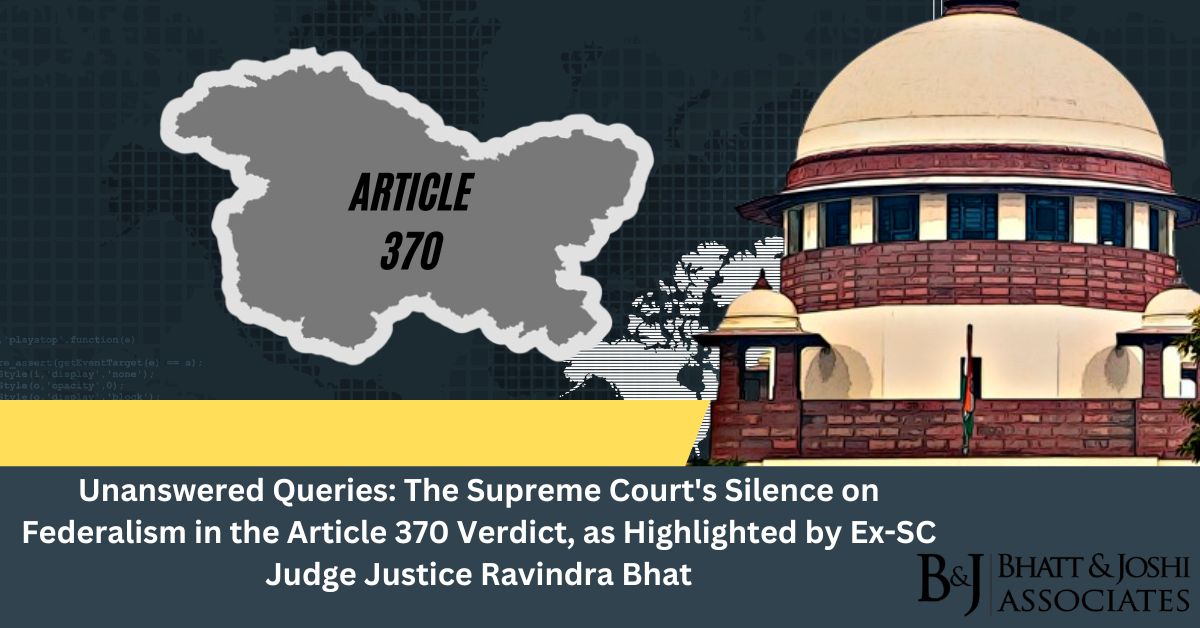Introduction
The verdict on Article 370 by the Supreme Court of India has been a subject of significant scrutiny and debate since its issuance. Retired Supreme Court judge Justice S Ravindra Bhat, in his recent remarks, shed light on a crucial aspect that remained unaddressed in the Court’s decision – the issue of federalism. This essay aims to explore the implications of the Supreme Court’s silence on federalism in the Article 370 verdict, as elucidated by Justice Ravindra Bhat. Through an analysis of relevant legal principles, precedents, and contemporary constitutional concerns, we seek to understand the broader ramifications of this omission within the Indian legal landscape.
Contextualizing the Concern
To comprehend the significance of Justice Bhat’s remarks, it is essential to contextualize the issue within the broader framework of constitutional law and governance in India. The abrogation of Article 370, which granted special status to the erstwhile state of Jammu and Kashmir, was a landmark decision with far-reaching implications. While the Supreme Court upheld the constitutional validity of this move, questions surrounding federalism and the powers of the Parliament remained unanswered. Justice Bhat’s critique highlights the need for a robust examination of federal principles within the Indian constitutional framework, particularly in the context of state reorganization and centralization of powers.
Federalism in the Article 370 Verdict: Key Points of Concern
Justice Bhat’s critique centers on the Court’s failure to address the fundamental question of whether the Parliament has the authority to downgrade a State into a Union Territory. This omission is particularly concerning as it has significant implications for the federal structure of the Indian polity. By accepting assurances from the Solicitor General regarding the restoration of statehood for Jammu and Kashmir without specifying a timeline or addressing the broader legal implications, the Court missed an opportunity to clarify the constitutional boundaries of federalism.
Analyzing Legal Precedents
To elucidate the gravity of the issue, it is instructive to analyze relevant legal precedents and judicial interpretations that inform the understanding of federalism in India. The concept of asymmetric federalism, as articulated in cases such as Govt. of NCT of Delhi v Union of India, underscores the nuanced relationship between Union Territories and the Union government. By recognizing the distinct treatment afforded to different Union Territories based on their constitutional status, the Court has established a framework for accommodating regional diversity within the federal structure.
Examining Federalism in the Article 370 Verdict Through Legal Precedents
Justice Bhat’s remarks also draw attention to the evolving nature of constitutional jurisprudence in India, characterized by a dynamic interplay between legal principles and societal norms. Cases such as the Demonetization Case and the Maharashtra Assembly case have demonstrated the judiciary’s role in interpreting constitutional provisions in light of contemporary realities. As the Indian polity undergoes transformative changes, it is imperative for the judiciary to adapt interpretations to reflect evolving societal norms while maintaining fidelity to constitutional principles.
Navigating Technological Advancements
In addition to constitutional principles, Justice Bhat’s remarks also touch upon the impact of technological advancements on legal norms and governance. The rise of Artificial Intelligence (AI) and machine learning technologies has posed novel challenges to traditional legal frameworks, particularly in areas such as privacy, public opinion, and policymaking. As AI-enabled products permeate various aspects of society, there is a pressing need for collective efforts to navigate these challenges and reshape legal norms to align with the realities of the digital age.
Conclusion: Implications for Federalism in the Article 370 Verdict
In conclusion, Justice Ravindra Bhat’s critique of the Supreme Court’s silence on federalism in the Article 370 verdict highlights broader concerns regarding the interpretation and application of constitutional principles in India. By failing to address fundamental questions surrounding federalism and the powers of the Parliament, the Court missed an opportunity to provide clarity on critical issues of governance and constitutional law. Moving forward, it is imperative for the judiciary to engage in robust deliberations on federalism and adapt legal interpretations to reflect evolving societal dynamics while upholding constitutional values. Only through such proactive engagement can the judiciary fulfill its role as a guardian of constitutional democracy and ensure the preservation of federal principles in India’s evolving political landscape.











